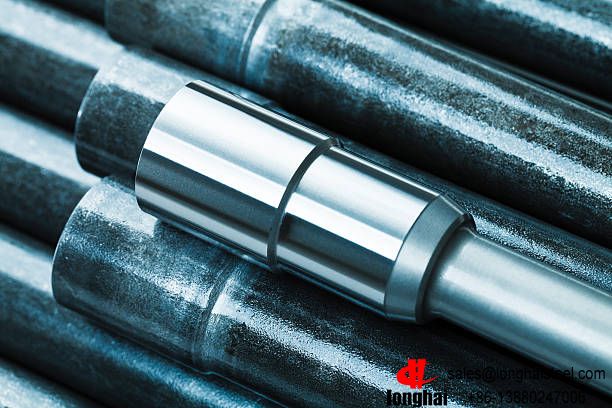Chemical composition optimization, microstructure and high temperature strengthening mechanisms of Nimonic 80A

Due to the high efficiency, reduced environmental pollution and high reliab ultra-supercritical coal-fired technology becomes the world leading commercialized power generation technology. The ultra-supercritical technology high capacity,parameters and efficiency is the development trend of coal-fired po plants. With the development ofultra-supercritical plants, it requires advanced temperature materials which can be used at higer temparture and stress. Nickel-b superalloys show high strength and have wide applications at high temperature du the stable microstructure. Nimonic 80A has been developed for more than ha centuryand is a kind of precipitate strengthening alloy with excellent creep oxidationresistance properties. Nimonic 80A was mainly used as blade materia aero-engine which required shorter service time than that in steam turbine in the Thetechnicalrequirements for ultra-supercritical steam turbine blade are verys and the stress-rupture life of Nimonic 80A at 750°C/310MPa must be higher than hin factorySo the chemical composition and heat treatment have been optimize order to form a stable manufacturing process for mass production in ultra-supercri steam turbine. Atom probetomography(APT),high resolution transmission elec microscopy(HRTEM),scanning electron microscopy(SEM), X-ray diffraction(X and thermal-calculation were employed to study the effects of alloying element room temperature mechanical properties, stress-rupture properties at 750°C/310N long-term stress-rupture properties at 600C/450MPa and creep propertie 750°C/240MPa of Nimonic 80A. The chemical compositions have been optim andthe effects of heat treatments on mechanical properties have also1 and the effects of heat treatments on mechanical properties have also investigated. The conclusions are shown as follows 1)The volume fraction ofy'phase increases with the increase of Al+Ti cor from 2.8 to 4.5 wt.%, which improves room temperature tensile strength stress-rupture life is the longest when Al+Ti content is about 4.05 wt.%.R temperaturetensilestrengthncreases senificantly with the increase of liAlratio from0.14to4.0but stress-rupture life first increases then decreases and the longest stress-rupture life appears when Ti/Al ratio is about 1.22. The B-NiAl phase can precipitate in thegrain interior when Ti/Al ratio is low, which can easily lead to the crackinginthegrain interior and finally the fracture ofalloys at high temperature. The n-NiTi phase can precipitate at grain boundary when Ti/Al ratio is high, which can leadtothe grain boundary cracking. Hence, low or high Ti/Al ratio is harmful to stress-rupture lifeand the ductility at high temperature is also bad for the alloy with high Ti/Alratio.Room temperature tensile strength increases slightly with the increase ofAlcontents from 1.4to 1.8 wt. %, while the corresponding elongation and reductioninareadecrease slightlyStress-rupture life increases significantly with the increase of Alcontent,and the high temperature ductility is also improved. The increaseofTicontent from 1.8 to 2.7 wt. % can increase the volume fraction of y phase,which improves roomtemperature tensile strength, however, stress-rupture life firstincreasesthendecreases.Thelongest stressrupture life appears with good high temperature ductilitywhen Ti content is about 2.25 wt. %. But the n-NiTi phase can precipitate when Ti content is too high. The n-NiTi phase can precipitate at grain boundarywhenAl+TiTiAlatio or Ticontents are too high. the brittle n-NiTi phase can easilyleadtograin boundary cracking, which reduces stress-rupture life but does no harm to room temperature tensile properties. 2)The contentofCrC6 carbide at grain boundary and in the grain interior increases with the increase ofCcontent from 0.01 to 0.10 wt. %, which suppresses grainboundarysliding andgrowth ofgrains, so room temperature tensile strength and stress-rupture life can beimproved. The grain boundary CrzC6 carbide exhibits an orientation relationship with y matrix when C content is about 0.10 wt.% which is beneficial to grain boundary strength at high temperature. What is more, the increase ofCcontent can also increase the lattice misfit of y'ly phases. The longest stress-rupture life appears with high ductility when C content is about 0.10 wt.%. 3)Nb can increase the precipitate temperature and volume fraction of r' phase in Nimonic 80A,which improves room temperature mechanical properties,
